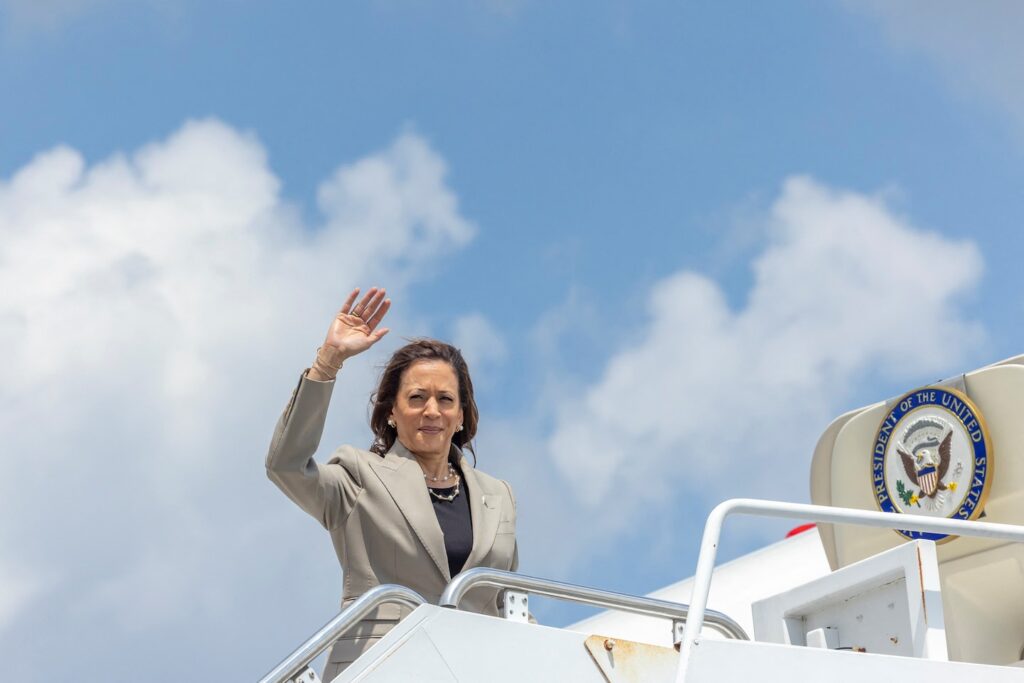So what would the race be like if Biden wasn't the nominee?
As a preliminary matter, the idea that someone with no experience running Joe Biden and Kamala Harris' campaign, no foreign policy experience, no vetting on a national stage, and no advantage of running on the strength of an incumbent's record, could win the nomination ahead of the vice president is implausible.
Will a random white governor with none of these advantages be introduced to the American people, revitalize the party, beat all the competition, and even snatch the first African-American and Asian-American woman vice president? Washington pundits can tell you all the scenarios they like, but without Harris as the nominee, the collapse of the Democratic Party is all but certain.
So let's assume Harris comes out on top. What would happen if that happened? Harris could make this race very different in a number of ways.
First, Harris, a healthy and energetic 59-year-old, would cast aside Biden's party baggage of age and health. Nearly 20 years younger than Trump (who will be 82 at the end of his second term), she would finally lead the country beyond the Baby Boomer generation and embody a fresh, younger generation of Americans. Without questions about Biden's physical and mental health, the media might finally focus on Trump's erratic rants, compulsive lying, and complete lack of policy knowledge.
Second, rather than a personal referendum on Biden, Harris would shift the campaign to one that forces a choice between the successful, economically productive, positive and inclusive record of a Biden Administration and the frightening, paranoid and authoritarian vision laid out in Trump's speeches and The Heritage Foundation's Project 2025 (which may guide a second Trump Administration). Harris could ask whether Americans want:
- Technical experts from departments and agencies who have served under presidents of both parties research, write rules and enforce regulations on everything from safe medicines to securities law to clean air and water. or A government in which crucial life-and-death decisions are made by 50,000 handpicked loyalists, hired not for their expertise but for their loyalty to Trump (they take an oath of loyalty)?
- An alliance of strong democracies helps defend U.S. interests against tyrannical invaders. or The kind of person who would kowtow before Vladimir Putin and other dictators, abandon Ukraine and leave Taiwan to fend for itself?
- An independent Federal Reserve with the dual mission of maintaining full employment and keeping inflation low, or, as Project 2025 envisions, a central bank subject to the whims of politicians and losing its role as a “lender of last resort”?
- a government that protects access to reproductive health care, does not discriminate against LGBTQ+ Americans (or any other specific group), and vigorously enforces voting rights; or Dobbs Reversal of decision Roe v. WadeWill we remove the abortion drug mifepristone from the shelves, literally remove terms like “sex” and “abortion” from all laws and regulations, and inject a Christian, male-centered view of the family into government policy?
Third, Harris speaks much more clearly and concisely than Biden, as she demonstrated in her detailed analysis of Trump's policies during a speech in North Carolina on Thursday. Similarly, Harris is a passionate advocate of reproductive freedom (a topic Biden seems uncomfortable talking about), as evidenced by dozens of speeches and public comments. She has used her experience as a sex crimes prosecutor to denounce forced-birth advocates who tell rape and incest victims that they “have no right or authority to decide what happens to their bodies.” (Harris flatly says, “That's immoral.”)
Fourth, given her background as a prosecutor and her role on the Senate Judiciary Committee, Harris is uniquely equipped to take on an extreme Supreme Court whose approval ratings have sunk to an all-time low — sharp enough to attack, for example, its broad granting of presidential immunity, its stripping of voting rights, and its substitution of judicial discretion for expert judgment in the administrative state.
Fifth, while Biden felt his support among younger voters (including non-white voters) was declining, Harris has the energy to engage and excite them, as seen in her visits to colleges where she spoke to packed audiences about issues that specifically affect their generation, including gun violence, climate change and abortion rights.
And finally, Harris can assume a position of international leadership — she has traveled the world, met with leaders and represented the U.S. at international conferences — without carrying the same baggage of personal criticism, legitimate or not, as Biden has on several key issues, including the Gaza war. (On Israel, Harris is a staunch supporter of the Jewish state and, together with her Jewish husband, has been outspoken about the abuse of Israeli women by Hamas, but she is also willing to draw a careful line with Israel's hardline prime minister.)
To be sure, it's impossible to predict how many votes a candidate will receive before the race is underway. Future polls won't show us for certain whether Harris will win more votes than she loses. But for Democrats who are constantly on the defensive, Harris is inspiring, eloquent, effective on key issues, and, above all, capable of refocusing attention on Trump's serious character flaws, criminal record, and worrying plans for the future — more than Biden can do at this point.

